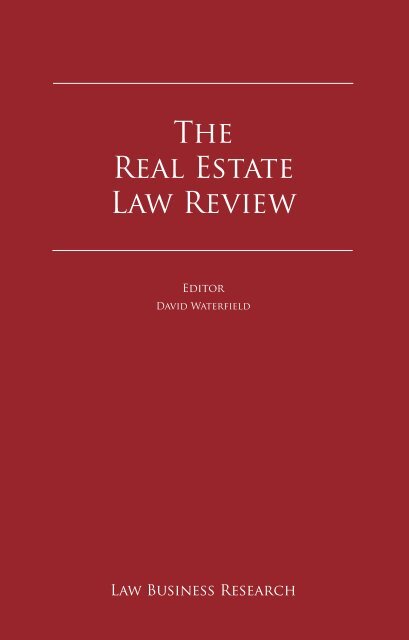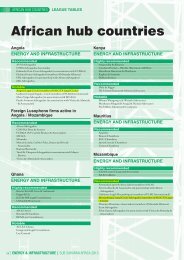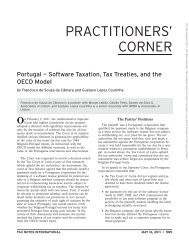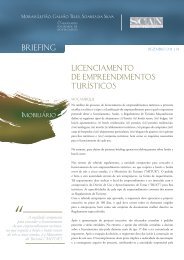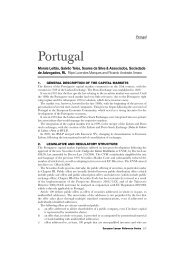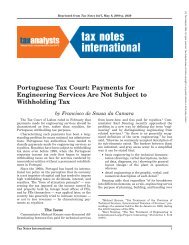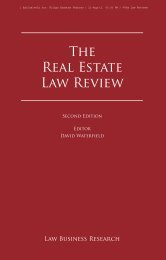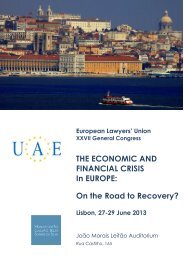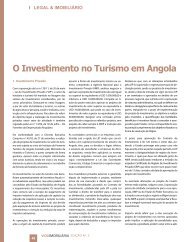The Real Estate Law Review - Morais Leitão, Galvão Teles, Soares ...
The Real Estate Law Review - Morais Leitão, Galvão Teles, Soares ...
The Real Estate Law Review - Morais Leitão, Galvão Teles, Soares ...
You also want an ePaper? Increase the reach of your titles
YUMPU automatically turns print PDFs into web optimized ePapers that Google loves.
<strong>The</strong><br />
<strong>Real</strong> <strong>Estate</strong><br />
<strong>Law</strong> <strong>Review</strong><br />
Editor<br />
David Waterfield<br />
<strong>Law</strong> Business Research
<strong>The</strong> <strong>Real</strong> <strong>Estate</strong> <strong>Law</strong> <strong>Review</strong><br />
Reproduced with permission from <strong>Law</strong> Business Research Ltd.<br />
This article was first published in <strong>The</strong> <strong>Real</strong> <strong>Estate</strong> <strong>Law</strong> <strong>Review</strong>,<br />
1st edition (published in April 2012 – editor David Waterfield).<br />
For further information please email Adam.Sargent@lbresearch.com<br />
2
<strong>The</strong><br />
<strong>Real</strong> <strong>Estate</strong><br />
<strong>Law</strong> <strong>Review</strong><br />
Editor<br />
David Waterfield<br />
<strong>Law</strong> Business Research Ltd
Publisher<br />
Gideon Roberton<br />
business development manager<br />
Adam Sargent<br />
marketing managerS<br />
Nick Barette, Katherine Jablonowska<br />
marketing assistant<br />
Robin Andrews<br />
editorial assistant<br />
Lydia Gerges<br />
production manager<br />
Adam Myers<br />
production editor<br />
Joanne Morley<br />
subeditor<br />
Anna Andreoli<br />
editor-in-chief<br />
Callum Campbell<br />
managing director<br />
Richard Davey<br />
Published in the United Kingdom<br />
by <strong>Law</strong> Business Research Ltd, London<br />
87 Lancaster Road, London, W11 1QQ, UK<br />
© 2012 <strong>Law</strong> Business Research Ltd<br />
No photocopying: copyright licences do not apply.<br />
<strong>The</strong> information provided in this publication is general and may not apply in a specific<br />
situation. Legal advice should always be sought before taking any legal action based<br />
on the information provided. <strong>The</strong> publishers accept no responsibility for any acts<br />
or omissions contained herein. Although the information provided is accurate as of<br />
February 2012, be advised that this is a developing area.<br />
Enquiries concerning reproduction should be sent to <strong>Law</strong> Business Research, at the<br />
address above. Enquiries concerning editorial content should be directed<br />
to the Publisher – gideon.roberton@lbresearch.com<br />
ISBN 978-1-907606-29-8<br />
Printed in Great Britain by<br />
Encompass Print Solutions, Derbyshire<br />
Tel: +44 870 897 3239
acknowledgements<br />
<strong>The</strong> publisher acknowledges and thanks the following law firms for their learned<br />
assistance throughout the preparation of this book:<br />
Advokatfirman Vinge KB<br />
Almeida Bugelli e Valença Advogados Associados<br />
Bonelli Erede Pappalardo<br />
Creel, García-Cuéllar, Aiza y Enríquez, SC<br />
De Brauw Blackstone Westbroek NV<br />
DE PARDIEU BROCAS MAFFEI<br />
DRYLLERAKIS & ASSOCIATES<br />
EDWARD NATHAN SONNENBERGS INC<br />
Ferrere Abogados<br />
Hengeler Mueller<br />
ILA Pasrich & Company<br />
Jorge Avendaño & Forsyth Abogados<br />
Kim & Chang<br />
Krogerus Attorneys Ltd<br />
Lee and Li, Attorneys-at-<strong>Law</strong><br />
LENZ & STAEHELIN<br />
Liedekerke Wolters Waelbroeck Kirkpatrick<br />
Loyens & Loeff, Avocats à la Cour<br />
MARVAL, O’FARRELL & MAIRAL<br />
i
Acknowledgements<br />
Mason Hayes & Curran<br />
<strong>Morais</strong> Leitão, Galvão <strong>Teles</strong>, <strong>Soares</strong><br />
da Silva & Associados<br />
Nagy és Trócsányi Ügyvédi Iroda<br />
Nishimura & Asahi<br />
Papadopoulos, Lycourgos & Co LLC<br />
Paul, Weiss, Rifkind, Wharton & Garrison LLP<br />
SAYENKO KHARENKO<br />
Schoenherr Attorneys at <strong>Law</strong><br />
Schoenherr si Asociatii SCA<br />
Shepherd and Wedderburn LLP<br />
Slaughter and May<br />
SNR Denton & Co<br />
Soewito Suhardiman Eddymurthy Kardono<br />
Uría Menéndez<br />
Wiersholm Mellbye & Bech, Advokatfirma AS<br />
ii
contents<br />
Editor’s Preface<br />
vii<br />
David Waterfield<br />
Chapter 1 Argentina 1<br />
Hernán Slemenson<br />
Chapter 2 Austria 14<br />
Peter Madl<br />
Chapter 3 Belgium 25<br />
Yves Delacroix<br />
Chapter 4 Brazil 36<br />
Marcelo José Lomba Valença<br />
Chapter 5 cyprus 45<br />
Nicolas Papaconstantinou<br />
Chapter 6 Czech Republic 55<br />
Martin Kubánek and Pavla Šlapáková<br />
Chapter 7 England & Wales 66<br />
David Waterfield<br />
Chapter 8 Finland 78<br />
Samuli Palin and Rami Salonen<br />
Chapter 9 France 85<br />
Pierre Gebarowski and Guillaume Rossignol<br />
Chapter 10 Germany 96<br />
Ingo Klöcker<br />
Chapter 11 Greece 106<br />
Paraskevi A Anargyrou and Stella G Yannika<br />
iii
Contents<br />
Chapter 12 Hungary 115<br />
Péter Berethalmi and Kata Molnár<br />
Chapter 13 India 124<br />
Amir Singh Pasrich<br />
Chapter 14 Indonesia 136<br />
Dyah Soewito and Denny Rahmansyah<br />
Chapter 15 Ireland 149<br />
Kevin Hoy<br />
Chapter 16 Italy 158<br />
Alessandro Balp<br />
Chapter 17 Japan 169<br />
Norio Maeda, Tomohiro Kandori and Yasuo Asami<br />
Chapter 18 Korea 183<br />
Yon Kyun Oh, Ann Seung-Eun Lee and Heung Suk Oh<br />
Chapter 19 Luxembourg 195<br />
Véronique Hoffeld and Marc Meyers<br />
Chapter 20 Mexico 204<br />
Carlos de Icaza Aneiros, Carlos del Rio S,<br />
Francisco Montalvo G and Jorge Torres Benítez<br />
Chapter 21 Netherlands 215<br />
Annemieke Wessels, Maarten Tinnemans and Max van Drunen<br />
Chapter 22 Norway 227<br />
Tom Rune Lian and Alexander Daae<br />
Chapter 23 Peru 238<br />
Francisco Avendaño<br />
Chapter 24 Poland 248<br />
Paweł Halwa and Michał Gruca<br />
Chapter 25 Portugal 258<br />
Filipa Arantes Pedroso<br />
iv
Contents<br />
Chapter 26 Romania 266<br />
Silvia Popa and Ionuţ Sava<br />
Chapter 27 Scotland 274<br />
Michael Henderson and Nick Ryden<br />
Chapter 28 South Africa 289<br />
Andrew Bembridge<br />
Chapter 29 Spain 298<br />
Diego Armero and Rodrigo Peruyero<br />
Chapter 30 Sweden 310<br />
Patrick Forslund and Niclas Winnberg<br />
Chapter 31 Switzerland 319<br />
Andreas Rötheli and Cécile Berger Meyer<br />
Chapter 32 Taiwan 328<br />
Yi-Jiun Su and Doris Lin<br />
Chapter 33 Ukraine 338<br />
Konstantin Gribov<br />
Chapter 34 United Arab Emirates 349<br />
Ibrahim Elsadig and Joe Carroll<br />
Chapter 35 United States 360<br />
Meredith J Kane<br />
Chapter 36 Uruguay 372<br />
Carlos Falco<br />
Appendix 1 About the Authors 382<br />
Appendix 2 Contributing <strong>Law</strong> Firms’ contact details 400<br />
v
editor’s Preface<br />
In an age that has seen ownership of real estate become increasingly international, it is<br />
more necessary than ever to appreciate the basic framework of real estate law in different<br />
jurisdictions. This book aims to give readers a general feel and overview of some of the<br />
key substantive and practical considerations in the major markets around the world.<br />
Each contributor to <strong>The</strong> <strong>Real</strong> <strong>Estate</strong> <strong>Law</strong> <strong>Review</strong> is a distinguished legal practitioner<br />
in his or her own jurisdiction, and this review represents an immediate and accessible<br />
summary of the most important and relevant issues across the many countries covered.<br />
<strong>The</strong> <strong>Real</strong> <strong>Estate</strong> <strong>Law</strong> <strong>Review</strong> seeks to identify distinctions in practice between the<br />
different jurisdictions by focusing on key developments that highlight particular local<br />
issues – we believe that this will help practitioners to develop their understanding of<br />
practice beyond their own borders. As both domestic and international clients become<br />
ever more sophisticated in this regard, real estate practitioners need to be familiar with<br />
the issues in the markets that are most relevant to the interests of their clients. Overseas<br />
investors have for some time been key influences in most jurisdictions and it is therefore<br />
vital that practitioners are able to advise on a particular transaction in the light of an<br />
understanding of the investor’s own home forum.<br />
In addition to bringing together topical cross-border real estate issues and practical<br />
information on real estate practice around the world, <strong>The</strong> <strong>Real</strong> <strong>Estate</strong> <strong>Law</strong> <strong>Review</strong> also<br />
seeks to offer an overview of activity levels in each jurisdiction and, therefore, the global<br />
real estate investment market. <strong>The</strong> impact of events such as the collapse of the US<br />
sub-prime residential mortgage market and the Eurozone crisis has demonstrated how<br />
complex and inter-related investment markets have become. It is no longer possible to<br />
ignore globalisation and view real estate markets in isolation. <strong>The</strong> financial and economic<br />
turmoil of the past few years will continue to affect the international real estate investment<br />
market; the scarcity of debt finance seems likely to continue for the foreseeable future<br />
and investors with funds will increasingly look to a global real estate market for value<br />
and safety.<br />
vii
Editor’s Preface<br />
I wish to express my deep and sincere thanks to all my distinguished colleagues<br />
who have contributed to this first edition of <strong>The</strong> <strong>Real</strong> <strong>Estate</strong> <strong>Law</strong> <strong>Review</strong>. I would also like<br />
to thank Gideon Roberton and his publishing team for their tireless work in coordinating<br />
the contributions from the various countries around the world.<br />
David Waterfield<br />
Slaughter and May<br />
London<br />
February 2012<br />
viii
Chapter 25<br />
Portugal<br />
Filipa Arantes Pedroso 1<br />
I<br />
INTRODUCTION TO THE LEGAL FRAMEWORK<br />
i<br />
Ownership of real estate<br />
<strong>The</strong> definition of property in Portugal follows that of other continental legal systems<br />
based on Roman law and the French Civil Code, encompassing not only ‘freehold’ but<br />
also other rights of guarantee and of acquisition. <strong>The</strong>refore the definition of property<br />
includes full possession and its exclusive use and disposition. In Portugal, there are no<br />
trusts, 2 except in the Free Zone of Madeira, where it is possible to incorporate a trust.<br />
A person can also own the title to a property while another person has the right to<br />
temporarily take the profits and the right to use and manage the property. 3 In addition, it<br />
is possible for a person to construct or maintain (permanently or temporarily) a building<br />
on land owned by another person, or to plant and maintain crops on such land. 4<br />
A property may be owned by one or more persons (common property) 5 and it<br />
is possible to divide buildings into segments (floors, etc.), which in Portugal is called<br />
horizontal property. 6<br />
ii Registration system<br />
<strong>The</strong> purchase and sale of a property (arable or agricultural land and urban land or<br />
buildings) must be executed by a notary or a lawyer, or the commercial and industrial<br />
1 Filipa Arantes Pedroso is a partner at <strong>Morais</strong> Leitão, Galvão <strong>Teles</strong>, <strong>Soares</strong> da Silva & Associados.<br />
2 A fiduciary relationship regarding property and subjecting the person with title to the property<br />
to equitable duties to deal with it for another’s benefit.<br />
3 Articles 1439 et seq. of the Civil Code.<br />
4 Articles 1524 et seq. of the Civil Code.<br />
5 Articles 1403 et seq. of the Civil Code.<br />
6 Articles 1414 et seq. of the Civil Code.<br />
258
Portugal<br />
office or the registry officers. <strong>The</strong>re are certain documents required for the purchase and<br />
sale of a property, notably a licence for use if a building, or a construction licence in case<br />
of urban land. Both these documents are issued by the municipality in which the relevant<br />
property is located.<br />
<strong>The</strong> purchase and sale of property must be registered with the Property Registry<br />
in order to produce effects against third parties; the Property Registry is part of the<br />
Portuguese state. Registration is compulsory with regard to any facts that create,<br />
recognise, acquire or modify any real estate rights. <strong>The</strong> right that is first registered prevails<br />
over other any subsequent rights registered.<br />
iii Choice of law<br />
<strong>The</strong> law applicable to the possession, title to property and other real estate rights is defined<br />
by the state in which the property is located; 7 therefore Portuguese law is applicable to<br />
the creation, recognition, acquisition or modification of any real estate rights in Portugal.<br />
In the indirect acquisition of real estate, share deals, share purchase and sale<br />
agreements may be subject to any other law that has a connection with the persons or<br />
companies involved; however, if the company or special-purpose vehicle is a Portuguese<br />
entity, Portuguese law requirements concerning the sale of shares or of any other<br />
participation such as quotas (participation in a company not represented by shares but<br />
registered at the Commercial Registry), or units in real estate investment funds, must be<br />
complied with.<br />
II<br />
OVERVIEW OF REAL ESTATE ACTIVITY<br />
<strong>The</strong> Portuguese economy was seriously affected by the financial crisis, which undermined<br />
the country’s economic activity. In an uncertain financial market the evolution of the<br />
Portuguese economy continues to be determined by the necessity of budget consolidation<br />
and the strengthening of the process of adjustment to macroeconomic growth with<br />
repercussions on economic growth and employment. This situation led to the bailout<br />
request to the EU, European Central Bank and International Monetary Fund. <strong>The</strong><br />
measures required by the memorandum of understanding (‘MoU’) entered into between<br />
those entities and the Portuguese government are being adopted, but the more optimistic<br />
forecasts still indicate no growth in 2012.<br />
<strong>The</strong> real estate investment market was one of the sectors significantly affected by<br />
the financial crisis. <strong>The</strong> main investors in Portuguese real estate between 1996 and 2010<br />
were EU countries, with Germany, the UK and the Netherlands occupying the leading<br />
positions, followed by France and Spain (outside the EU, the United States occupies the<br />
leading position).<br />
Tourism is certainly one of the main areas of activity in the Portuguese economy,<br />
and is considered a strategic and priority sector. Due to the uncertainty of the Portuguese<br />
and European economies, together with the public debt and the lack of liquidity of<br />
companies (associated with difficulty in obtaining bank financing), investors appear to<br />
7 Article 46(1) of the Civil Code.<br />
259
Portugal<br />
be waiting for better circumstances before proceeding with the real estate investments.<br />
Banks have been working with their debtors to find solutions avoiding sales at actual<br />
market prices and the immediate accounting of imparities, so opportunities will no<br />
doubt arise in the near future and investors are waiting for such opportunities. It will be<br />
necessary to find a compromise between the prices at which sellers are willing to sell and<br />
buyers willing to buy, but there may well be more transactions in 2012 than in 2011.<br />
<strong>The</strong> main areas that have been identified as priority areas for the economic growth of<br />
real estate market and the country are tourism (residential – senior tourism, health and<br />
well-being – and business tourism) and building renovation.<br />
III<br />
DEVELOPMENTS IN REAL ESTATE PRACTICE<br />
<strong>The</strong> MoU that followed the request for financial assistance by Portugal provides for the<br />
implementation of specific legislation concerning services and changes in the housing<br />
market.<br />
<strong>The</strong> Services Directive easing the requirements related to the establishment of<br />
individuals and companies and reducing the number of requirements to which crossborder<br />
providers are subject was implemented by Decree-<strong>Law</strong> No. 69/2011 of 15 June.<br />
This law sets out sector-specific amendments in the access to construction and real estate<br />
activities, simplifying the requirements applying to cross-border providers – for both<br />
types of activity – and reviews of the obstacles to the establishment of service providers<br />
such as restrictions on sub-contracting (for construction) and on excessive liquidity<br />
obligations and physical establishment (for real estate).<br />
Following the request of the MoU in what concerns the housing market, and in<br />
order to improve access to housing, foster labour mobility, improve the quality of housing<br />
and make better use of the housing stock, and reduce the incentives for households to<br />
build up debt, the government has proposed a New Urban Lease Act <strong>Law</strong>, which amends<br />
the Civil Code, the Civil Procedure Code and <strong>Law</strong> No. 6/2006 of 27 February. <strong>The</strong><br />
purpose of the amendments are to ensure balanced rights and obligations of landlords<br />
and tenants. Such amendments will:<br />
a broaden the conditions under which renegotiation of open-ended residential<br />
leases can take place;<br />
b introduce a framework to improve access to housing by phasing out rent-control<br />
mechanisms;<br />
c<br />
d<br />
reduce the prior notice for termination of leases for landlords; and<br />
provide for an extrajudicial eviction procedure for breach of contract, aiming at<br />
shortening the eviction time to three months.<br />
Finally, in the area of renovation works, a proposal by the government to amend Decree-<br />
<strong>Law</strong> No. 307/2009 of 23 October aims to simplify administrative procedures concerning<br />
the creation of areas of renovation, simplify the control of renovation works, and include<br />
in the concept of renovation certain isolated operations in buildings or parts of buildings,<br />
even if located outside the areas of renovation, provided that the construction is more<br />
than 30 years old and merits renovation.<br />
260
Portugal<br />
<strong>The</strong>se two new amendments, concerning leases and renovation works, are yet<br />
to be discussed in parliament and therefore some changes may be agreed prior to their<br />
respective implementation.<br />
IV<br />
REAL ESTATE AND FOREIGN INVESTMENT<br />
<strong>The</strong>re are no restrictions concerning the ownership of real estate by non-resident or<br />
foreign investors, which means they are treated the same as Portuguese nationals or<br />
residents. Tourism and activities declared to be of interest to tourism according to the<br />
applicable legislation may be granted tax incentives. Companies established in Portugal<br />
may be entitled to a special investment support regime, notably exemption from property<br />
transfer tax (‘IMT’) and stamp duty on the acquisition of land and property if considered<br />
a relevant investment.<br />
V<br />
STRUCTURING THE REAL ESTATE INVESTMENT<br />
<strong>Real</strong> estate can be acquired directly (in an asset deal) or indirectly (in a share deal).<br />
<strong>The</strong> asset deal is subject to IMT at a rate of 6.5 per cent on the price or patrimonial<br />
value (whichever is higher) for urban property (buildings and land for construction), or<br />
5 per cent for rural property (arable or agricultural land). <strong>The</strong> rate is higher in the case<br />
of offshore properties established in certain countries and listed in the applicable law.<br />
<strong>The</strong> asset deal is also subject to stamp duty at the rate of 0.8 per cent on the price<br />
or patrimonial value, again, whichever is higher.<br />
<strong>The</strong> rule is that value added tax (‘VAT’) is not applicable; however, if certain<br />
conditions are met, the owner may renounce this exemption of VAT. This option may be<br />
interesting to explore as it allows the seller to deduct the VAT paid during construction<br />
or any other VAT applied during its course of the business.<br />
In relation to share deals, the most popular investment vehicles are commercial<br />
companies: public limited liability companies or private limited liability companies<br />
(‘Lda’). Other common investment vehicles are real estate investment funds (‘FIIs’) and<br />
real estate investment companies (‘SIIMOs’).<br />
In the case of commercial companies, if the real estate is already owned by the<br />
company, the aforementioned transfer taxes – IMT and stamp duty – do not apply; if,<br />
however, the company is a ‘quota’ company – an Lda – the transfer taxes will apply if the<br />
company has only one shareholder or if one of the shareholders holds a participation of<br />
more than 75 per cent. Income from real estate is subject to general corporate income tax<br />
(‘IRC’), which in 2012 is 25 per cent accrued on 3 per cent of the taxable profit between<br />
€1.5 million and €10 million, and 5 per cent on the taxable profit above €10 million.<br />
IRC is also accrued on municipal tax (‘IMI’), which cannot be higher than 1.5 per cent.<br />
In principle, all the costs connected with the real estate may be deducted.<br />
Any capital gains obtained by the sale of the real estate are also subject to IRC,<br />
but 50 per cent may be deductible if, during the following two years, the capital gains<br />
are reinvested. Dividends paid by the resident companies or resident individuals are<br />
subject to a tax of 25 per cent; non-residents from the EU are exempt from paying taxes<br />
261
Portugal<br />
in Portugal if their shareholding is of at least 10 per cent. <strong>The</strong>re are various agreements<br />
in force in Portugal to avoid double taxation.<br />
FIIs can be open or closed-end funds depending on whether they are incorporated<br />
by public or private subscription. FIIs do not have legal capacity and therefore are managed<br />
by management companies or credit institutions. <strong>The</strong> incorporation of a management<br />
company requires the authorisation of the Bank of Portugal, and the incorporation of<br />
an FII needs authorisation from the Stock Market Commission (CMVM) and is then<br />
subject to its supervision. SIIMOs have legal capacity and can have variable capital<br />
(‘SICAVI’), with a similar regime to the open-end FII, or fixed capital (‘SICAFI’), which<br />
has the same regime as a closed-end FII.<br />
In the acquisition of real estate, the open-end FII and SICAVI are exempt from<br />
IMT and stamp duty. Closed-end FII and SICAFI whose units are held by qualified<br />
investors or by financing institutions pay only 50 per cent of IMT and stamp duty. In<br />
what concerns the property income of the FII and SIIMO, the tax is of 20 per cent and<br />
applies to the net income, which does not include conservation and maintenance, and<br />
IMI. <strong>The</strong> FII and SIIMO may not deduct the interest of the financing obtained for the<br />
acquisition or construction of real estate. <strong>The</strong> capital gains tax rate is 25 per cent over<br />
half of the positive difference between gains and losses made. <strong>The</strong> management company<br />
must pay this and income tax in April of the following year.<br />
<strong>The</strong> income held by non-residents in Portugal distributed by the FII and SIIMO<br />
is exempt from tax in Portugal.<br />
VI<br />
REAL ESTATE OWNERSHIP<br />
i Planning<br />
<strong>The</strong> Portuguese planning and licensing legislation is for the most part contained 8 in<br />
the Basic <strong>Law</strong> of Political Planning of the Territory and Urbanism, in the legal regime<br />
applicable to territorial management instruments and in the legal regime for licensing<br />
and development (‘the RJUE’). <strong>The</strong> municipalities have an important role in the<br />
planning and licensing of real estate projects. Planning in Portugal is made in accordance<br />
with previous options contained in plans. <strong>The</strong>refore, in the development of a real estate<br />
project, it is important to analyse the applicable rules of territorial management, notably<br />
the special plans and the municipality plans.<br />
<strong>The</strong> rules for the licensing of a real estate project are contained in the RJUE, and<br />
aims, in general terms, to confirm whether the project complies with the applicable law.<br />
<strong>The</strong> municipalities are the entities responsible for the licensing of projects, however,<br />
there are other entities that need to be consulted and in certain cases their opinions are<br />
binding (for example, Tourism of Portugal in tourism projects). When construction is<br />
complete, a licence must be obtained that confirms that the construction was concluded<br />
in accordance with the approved designs and the conditions of the construction licence.<br />
This user licence certifies the relevant building or fraction can go into use. Tourism<br />
8 Notwithstanding the Constitution, which has principles concerning planning and development.<br />
262
Portugal<br />
projects also need to comply with the legal regime for the Installation, Operation and<br />
Functioning of Tourism Projects.<br />
Certain retail commercial establishments and groups of establishments that have<br />
selling spaces above certain thresholds – 2,000 square metres, 30,000 square metres or<br />
8,000 square metres – also require special licences; these are generally called commercial<br />
licences.<br />
ii Environment<br />
<strong>The</strong> Environmental Liability <strong>Law</strong>, 9 based on the ‘polluter-pays’ principle, establishes that,<br />
if any damage of the environment occurs or a threat of damage exists due to a private<br />
or public economic activity, the entity responsible must take the necessary measures to<br />
repair the damage or prevent other damages (administrative liability) and will also repair<br />
all damages suffered by the individuals affected by such activities (civil liability).<br />
Criminal liability can arise from damage to the environment such as contamination<br />
of soil, which is considered a criminal offence and is punishable by up to three years’<br />
imprisonment or a fine equivalent to 600 days of imprisonment according to the<br />
Criminal Code.<br />
iii Tax<br />
As previously mentioned, the acquisition of real estate is subject to IMT at the rate of<br />
6.5 per cent on the price or patrimonial value, whichever is higher, for urban property<br />
(buildings and land for construction) or 5 per cent on the price or patrimonial value,<br />
whichever is higher, for rural property (arable land). <strong>The</strong> acquisition of a property is<br />
also subject to stamp duty at the rate of 0.8 per cent on the price or patrimonial value,<br />
whichever is higher.<br />
Properties are also subject to a IMI paid every year in two instalments, one in<br />
April and another in September, at the rate of between 0.5 per cent and 0.8 per cent for<br />
urban properties that were not evaluated in accordance with the IMI Code and between<br />
0.3 per cent and 0.5 per cent if the property was evaluated in accordance with the IMI<br />
Code. Rural properties are subject to a rate of 0.8 per cent. Properties owned by certain<br />
offshore entities listed in the applicable law pay 7.5 per cent.<br />
<strong>The</strong> MoU provides also that the government will review the framework for the<br />
valuation of housing stock and land for tax purposes, and will present measures to ensure<br />
that by the end of 2012 the taxable value of all property is close to market values, and<br />
valuation is updated regularly (every year for commercial real estate and once every three<br />
years for residential real estate as foreseen in the applicable law).<br />
iv Finance and security<br />
A loan agreement secured by a mortgage is the most common financing and security in<br />
real estate projects in Portugal. A mortgage grants the creditor the right to be paid a certain<br />
amount with priority over other creditors without any special privilege. <strong>The</strong> mortgage is<br />
9 Decree-<strong>Law</strong> No. 147/2008 of 29 July.<br />
263
Portugal<br />
created by an authenticated private document or by a deed executed by a notary public.<br />
<strong>The</strong> mortgage needs to be registered at the Property Registry to be effective.<br />
Other security, such as the pledge, is also quite common and usually required in<br />
addition to the mortgage by the financing party. If the property is owned by a company,<br />
there is the pledge of shares or quotas, and such pledge of quotas needs to be registered at<br />
the Companies Registry. <strong>The</strong> requirements for a pledge of shares depends on the type of<br />
shares: bearer, nominative or book entry shares. A pledge of credit rights such as leases,<br />
bank accounts, insurance policies or construction contracts is also quite common. <strong>The</strong><br />
creditor will usually require the pledge over the credit rights that the debtor is entitled to<br />
and which represent the main revenue of the project being financed. In certain conditions<br />
the pledge can be qualified as a financial pledge. Personal security is also usually required<br />
by the financing party to the shareholders or parent company of the company owning<br />
the property.<br />
Financing and security granted in Portugal or to Portuguese companies is subject<br />
to stamp duty over the amount of the financing or the maximum amount secured. If<br />
security is accessory to a finance agreement and granted simultaneously, the security is<br />
not subject to stamp duty, meaning the stamp duty only applies to the amount of the<br />
financing. <strong>The</strong> rates of the stamp duty are 0.4 per cent if the financing or security is for<br />
less than one year; 0.5 per cent if the term is between one and five years; and 0.6 per cent<br />
if it is longer than five years.<br />
VII<br />
LEASES OF BUSINESS PREMISES<br />
Since 2006 lease contracts have fallen under the Civil Code. Lease agreements for longer<br />
terms than six months must be in writing. If a property is sold, the leases do not terminate<br />
and are automatically assigned to the new owner of the property. <strong>The</strong>re are two types<br />
of leases: housing and non-housing, or commercial. <strong>The</strong> main terms and conditions of<br />
the commercial leases are freely agreed between the parties, notably in what concerns<br />
the duration, termination and opposition to the extension. <strong>The</strong> maximum duration of<br />
a commercial lease is 30 years and if the parties do not establish a duration, the law<br />
provides a default a 10-year period, and the tenant can terminate the lease with one year’s<br />
notice.<br />
<strong>The</strong> parties can also freely agree the responsibility for the maintenance of the<br />
leased premises; however, if the agreement does not specify this matter the landlord will<br />
be responsible for such maintenance. <strong>The</strong> amount of the rent and other costs are also<br />
freely agreed between the parties.<br />
<strong>The</strong> assignment of a lease agreement is subject to the consent of the landlord<br />
except in the case of a transfer of an ongoing business, where the lease is included. In this<br />
case, the landlord has a right of pre-emption, except if the parties have agreed otherwise.<br />
<strong>The</strong> tenant, however, has a right of pre-emption in the sale of a leased premises to a third<br />
party, provided that it has been in the leased premises for more than three years; in this<br />
case the parties may not agree otherwise.<br />
Any party may terminate the lease in case of default of the other party. Termination<br />
by the landlord must be declared by a court decision except in the case of opposition of<br />
the tenant to works ordered by public authorities, or non-payment of the rent, costs and<br />
264
Portugal<br />
expenses for three months. In this case termination is effective with the communication<br />
to the tenant except if, in the following three months the tenant pays the amounts due<br />
with a penalty (50 per cent of the amounts due) or allows the works requested. This<br />
means that at the very least the tenant remains in the leased premises for six months:<br />
three months for the landlord to terminate and another three months prior to paying,<br />
not paying or agreeing to the works (this amounts to a six-month delay counted from the<br />
notification of the landlord). As previously mentioned (Section III, supra) amendments<br />
to the law envisage this delay being reduced to three months.<br />
<strong>The</strong> use of spaces in shopping centres, retail parks, commercial galleries, outlets,<br />
offices located in office parks or warehouses located in retail parks that fulfil certain<br />
requirements are not considered leases agreement and, therefore, the aforementioned<br />
legislation does not apply: these are called ‘non-typified contracts’. <strong>The</strong> users of these spaces<br />
are not considered simple tenants as their establishments benefit from common services<br />
provided by the management company, notable publicity, security and maintenance of<br />
common spaces. In these cases pre-emption rights, assignments of ongoing business,<br />
pledges of lease rights and termination processes do not apply.<br />
VIII OUTLOOK AND CONCLUSIONS<br />
Implementation of the amendments to the lease law is an important step concerning<br />
the housing market, which is expanding considerably with the difficulties in obtaining<br />
financing to buy houses; demand is now bigger than supply. <strong>The</strong> necessity for renovation<br />
is becoming a considerable problem in Portuguese cities due to the low rents paid by the<br />
tenants, and this is another important issue to resolve. <strong>The</strong> biggest challenge, however,<br />
is for the courts to act faster, and this is also addressed by the new law; in certain cases a<br />
court decision is not required and appeals do not suspend the decision of the lower court.<br />
It is difficult to say whether 2012 will be better than 2011, as much depends on<br />
the EU and the problems within the Eurozone. <strong>The</strong> restructuring of the banks, which<br />
have a lot of real estate to inject into the market, is another problem that will take some<br />
time to resolve. Prices need to adjust and foreign investors need to believe that real<br />
estate investment in Portugal is worthwhile. Tourism, especially senior tourism, is a key<br />
factor for the Portuguese economy but is also dependent on the confidence of investors.<br />
According to the National Strategic Plan for Tourism, enhancing and developing<br />
residential tourism infrastructures, focusing on the elderly and health care, is a priority.<br />
265
Appendix 1<br />
About the Authors<br />
Filipa Arantes Pedroso<br />
<strong>Morais</strong> Leitão, Galvão <strong>Teles</strong>, <strong>Soares</strong> da Silva & Associados<br />
Filipa Arantes Pedroso joined the firm in 1979 and became a partner in 1987. She is the<br />
sub-coordinator of the corporate department and head of the real estate team.<br />
She is very active in mergers and acquisitions, and company law, having acted for<br />
relevant national and international clients. She has also been very active in the project<br />
finance area.<br />
In the area of real estate, Filipa Arantes Pedroso has been responsible for the firm’s<br />
major projects concerning the structuring of real estate transactions, tourism projects<br />
and incorporation of real estate management companies and real estate funds.<br />
She is the author of several articles in national and international specialist<br />
magazines.<br />
<strong>Morais</strong> Leitão, Galvão <strong>Teles</strong>, <strong>Soares</strong> da Silva & Associados<br />
Rua Castilho 165<br />
1070-050 Lisbon<br />
Portugal<br />
Tel: +351 21 381 7428<br />
Fax: +351 21 382 6629<br />
fapedroso@mlgts.pt<br />
www.mlgts.pt<br />
382


